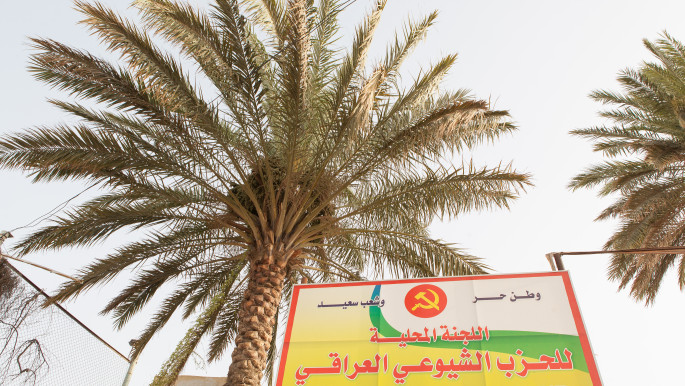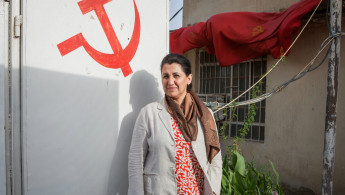Haïfa al-Amin: A step towards social equality in Iraq
"Madam, we have to do something for our homes, many don't have access to running water," a police officer wearing a fatigued blue military garment respectfully complains as The New Arab sits with her.
Stylish glasses on her nose and a scarf on her shoulders, al-Amin listens and promises upcoming improvements in public services.
Nicknamed "the woman who shakes hands with men", al-Amin refuses to wear a veil, as socially expected by the conservative mindset of her province.
The candidate for the Iraqi Communist Party (ICP) in Dhi Qar, al-Amin won a seat in the May 12 parliamentary election campaigning to improve public services in southern Iraq. Her victory revives the legacy of al-Amin's uncle, the founder of the very first ICP office in Iraq, which opened in 1934 in Nasiriyah, Dhi Qar's capital.
Read also: Challenges and hopes: The women standing for Iraq
Before the May 12 elections, the ICP allied with the Sairoon Alliance, a national and civil movement led by Shia Muslim cleric Muqtada al-Sadr.
The coalition topped the poll, and the Communists secured two of the 54 seats won by the alliance. It is the first time in Iraq's history that the ICP have obtained multiple seats.
 |
|
| Headquarters of the Iraqi Communist Party in the Dhi Qar Governorate, South Iraq [Sebastian Castelier] |
Tackle corruption and improve public services
In the election campaign, tribal leaders rushed to exchange their votes for a few hundred dollars.
"I strongly refused," claims al-Amin. To tackle local corruption, which pervades in the public sector, she intends to set up oversight bodies for every local public institution, to know where the budget is truly being spent.
In addition to addressing corruption, al-Amin aims to improve public services.
"In Dhi Qar, some schools do not have access to running water or toilets, and a class can exceed 70 students. Children only go to school for three hours a day, because we have a rotation due to the lack of space," al-Amin tells The New Arab.
As for public hospitals, patients wait for an under-equipped service, but are treated better and faster by the same doctors when they pay for private consultations.
 |
|
| Come and see who else we've been talking to in this exclusive series |
"This extra money goes into the pockets of these corrupt officials," says al-Amin.
However, it appears that not everyone is ready to accept al-Amin's political programme.
"The intelligence services informed me that I am on a list of personalities to be shot. They assigned me two bodyguards, but I'm not afraid," she says.
Armed insurrection
At the age of 59, Haïfa al-Amin has finally reached parliament, having been a member of the Iraqi Communist Party since 1977.
At the end of the 1970s, on the eve of taking over from former president Ahmad Hassan al-Bakr, Saddam Hussein started to neutralise political opponents.
"My two best friends were executed with their husbands," al-Amin said.
A year after joining the Iraqi Communist Party, at the age of 18, al-Amin was briefly arrested by the Baath Party. As Communists were imprisoned en masse or executed, she fled to the People's Democratic Republic of Yemen, a Communist-style state that existed from 1967 to 1990.
Provided with a Yemeni passport and accommodation in Aden, al-Amin, along with hundreds of exiled Iraqi Communists, joined a military training camp where she was trained to handle firearms.
When the Iraqi Communist Party declared an armed struggle against Saddam's regime in the early 1980s, al-Amin returned to northern Iraq. For a year, she participated in several military offensives.
"We had several rules: don't kidnap anyone, don't kill innocent people, don't attack civilian places like schools or hospitals."
When the fight intensified, al-Amin, then pregnant, took refuge in Sweden.
 |
|
| People wait at the taxi rank in Nasiriyah, a city in south Iraq. Haifa al-Amin found it a changed city after the US-led invasion [Sebastian Castelier] |
'My city had changed'
Following the 2003 US-led invasion of Iraq, al-Amin returned to Nasiriyah, to rebuild the Iraqi Communist Party.
"My city had changed. The Islamic Dawa Party had invested in social life. Children learned to do their ablutions at school according to their branch of Islam - Shiaism or Sunnism," al-Amin remembers.
In the vacuum left by the overthrow of Saddam Hussein, radical Islamist communities gained power. Sectarian tensions led to a civil war from 2006 to 2008. And even now, Communist militant Yassir Salim tells The New Arab, "many still associate Communism with atheism".
"This amalgam keeps hurting us," he adds.
Decimated by decades of political repression, the Iraqi Communist Party is now trying to rise from the ashes.
Hanging on the walls of the Dhi Qar's Communist Party headquarters are images of Communist militants who died in the political repression, along with a portrait of Che Guevara.
Meanwhile, seated behind her desk in Nasiriyah, al-Amin carefully reviews her first actions once in office: programmes to build social equality, political secularism and public services.
Quentin Muller is an Oman-focused French journalist. Follow him on Twitter: @MllerQuentin.
Sebastian Castelier is a photojournalist specialising in the MENA region. Follow him on Twitter: @SCastelier
The New Arab Meets: Click on our Special Contents tab to read more on our ever-growing archive of interviews



